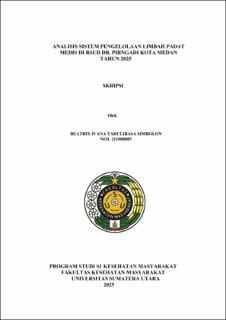| dc.description.abstract | Nosocomial infections are infections acquired during medical treatment. WHO reports 5-15% of patients in developed countries experience nosocomial infections, with a higher prevalence in developing countries. In North Sumatra, the prevalence of nosocomial infections was recorded at 5.6%, while one type B hospital in Medan City recorded 13.92% in 2017. The hospital generates 245 kg of medical solid waste per week. Although non-infectious and infectious waste are separated, infectious waste is still combined in one plastic bag. In addition, some officers have not used Personal Protective Equipment (PPE), and the hospital incinerator is no longer functioning. Based on this, it is necessary to conduct research related to medical solid waste management. This type of research is descriptive which aims to analyze the process of medical solid waste management at RSUD Dr. Pirngadi with the object of research as many as 6 rooms. The results showed that the total weight of medical solid waste in a period of 4 months was 2,908.95 kg. The sorting of medical solid waste in the Medical Rehabilitation Installation Room, Emergency Room (IGD), Surgical Poly, and Hemodialysis Installation met the requirements, the packaging of medical solid waste. in the Medical Rehabilitation Installation Room, Emergency Room (IGD), Surgical Poly, Pharmacy Room meet the requirements, transportation and storage of medical solid waste meet the requirements, medical solid waste management facilities and infrastructure meet the requirements and human resources meet the requirements. Sorting of medical solid waste in dental clinics and pharmacy does not meet the requirements, packaging of medical solid waste in dental clinics and hemodialysis installations does not meet the requirements. Suggestions to the hospital to post Standard Operating Procedures (SOPs) for medical solid waste management in strategic areas that are easily accessible, separate infectious waste according to its type, use separate transport trolleys between medical and non-medical solid waste, provide special lanes for transportation of medical solid waste and temporary storage temperature conditions for medical solid waste in Temporary Shelters (TPS) vary based on the classification of waste types. | en_US |


